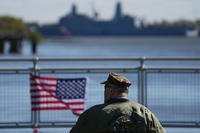Gen. B. Chance "Salty" Saltzman on Wednesday formally became the second officer to lead the Space Force since it was created just three years ago.
During a ceremony at Joint Base Andrews, Saltzman took the reins from outgoing Chief of Space Operations Gen. John "Jay" Raymond, who has led the service since its formation in late 2019. Frank Kendall, secretary of the Department of the Air Force, to which the Space Force belongs, was in attendance and praised both men for their dedication to leading a new service that lacks the financial backing of the other military branches.
"The Space Force would have to carry all the load associated with being a military service without anywhere near the resources associated with a traditional American military service," Kendall told the men during his remarks. "Jay and his team have met this challenge and positioned the Space Force for success. ... Salty, you have some big shoes to fill, and I know you're ready and we are lucky to have you as the second chief of space operations."
Read Next: SpaceX Nails Booster Landings After Foggy Military Launch
Saltzman will lead the service at a time when space is becoming a more competitive environment. Adversaries such as China and Russia are developing technology that threatens America's satellite fleet, which is used for everything from GPS on phones to helping the U.S. military and its allies conduct operations on the battlefield.
"The world is becoming an increasingly dangerous place, and preserving U.S. national security interest in space is growing harder every day," Saltzman said during his speech. "A resilient, ready, combat-capable Space Force is indispensable to deterrence today, tomorrow and every day after that. And, in the worst case, if deterrence fails, the Space Force will be an indispensable component of our joint force at war."
The Space Force asked for $24.5 billion in its 2023 budget request, a 40% increase from the previous year. But to counter looming threats from other countries, it will likely ask for more funding in the coming years. Last week, a top official for the service said it needs more money to protect America's satellites as it faces rapid competition with China.
Attendees at the event included Defense Secretary Lloyd Austin and Chairman of the Joint Chiefs Gen. Mark Milley, as well as astronauts, lawmakers and Space Force officers.
Elon Musk, the founder of SpaceX, was also at the event and received praise from Milley.
"I would also like to recognize Elon Musk, who's here and who needs no introduction, certainly by me," Milley said. "But what he symbolizes, in reality, is the combination of the civil and military cooperation and teamwork that makes the United States the most powerful country in space."
Musk's appearance at the event came just one day after SpaceX launched its Falcon Heavy rocket for a classified mission on behalf of the Space Force. The billionaire's presence at the ceremony also came as the Department of Defense squares off with him over the financing of SpaceX's Starlink satellite technology, which has been used by Ukraine during Russia's invasion.
Raymond, during his retirement speech, also thanked Musk for being in attendance.
Kendall called the outgoing general the "Father of the Space Force." While Raymond declined to take credit for his role in starting the service -- instead thanking "bipartisan support from Congress" -- he did reflect fondly on the challenges of building a team from the ground up.
"Without a doubt, we are better postured and are a more capable and ready force than we were just three short years ago," Raymond said. "And although still in our terrible twos, we have attracted incredible talent. ... Starting with a clean sheet of paper to build a new service is hard, but space is hard and Guardians don't shy away from tough challenges."
Raymond was once an opponent of creating the Space Force. In 2017, as the head of Air Force Space Command, he penned an opinion piece for Defense One decrying congressional efforts to start a separate space corps and asking for more focus on and resources for the Air Force's existing mission.
But a lot has changed in the nearly three years since former President Donald Trump signed a defense policy bill and created the Space Force. Raymond was tasked with shaping the culture and identity of the newest military branch in more than 70 years, while also advertising its mission.
During his nearly 40-year military career, Raymond went from leading U.S. Space Command to becoming the first member of the Space Force to be sworn in. Now, the service has upward of 8,000 Guardians and a total force of 15,000 people, including contractors and civilians assisting the service's mission.
Raymond oversaw the creation of the service's uniforms, along with its motto, physical fitness standards and official song, and even helped cultivate the first Space Force boot camp for enlisted Guardians.
Austin said all of that was a tall order.
"He laid the foundations for the culture and the traditions that will define this service for decades to come," Austin said. "You know what? He did all that, and he made it look easy."
-- Thomas Novelly can be reached at thomas.novelly@military.com. Follow him on Twitter @TomNovelly.
Related: Citing Growing Threat from China, Space Force Leaders Say They Need More Money













